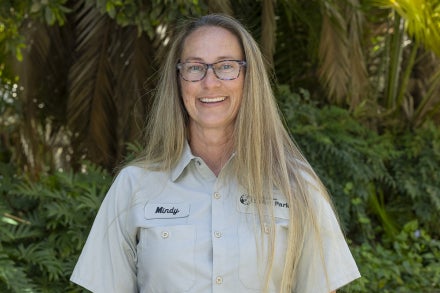
Zoo InternQuest is a seven-week career exploration program for San Diego County high school juniors and seniors. Students have the unique opportunity to meet professionals working for the San Diego Zoo, Safari Park, and Institute for Conservation Research, to learn about their jobs, and then blog about their experience online. Follow their adventures here on the Zoo’s website!

Interns pose with Ms. Kier in front of the koala habitat. To get the best chance of seeing action we recommend going later in the day when the weather is cool and they're awake.
What do you think it takes to raise a baby animal? Patience? Affection? Stress management? Becky Kier, Lead Neonatal Assisted Care Unit (NACU) Keeper at the San Diego Zoo, proves how raising a baby animal requires more skills than you would think. Having math skills, being ambitious, having attention to detail and a mind that is always thinking ahead are attributes that have allowed Ms. Kier to be so successful at her job. For 33 years Ms. Kier has devoted her time working for the San Diego Zoo and the majority of those years, 31 to be exact,she spent caring for special needs animals. Many babies who are born at the Zoo face challenges such as injuries, infections, and maternal neglect or maternal death. Ms. Kier and the four other fulltime NACU keepers at the Zoo are responsible for ensuring these babies are properly taken care of. Ms. Kier's daily routine consists of taking the baby's temperatures, bottle feeding every two to three hours, administering medications, washing and sterilizing bottles along with other feeding equipment, and making formulas for the babies. This is a job that Ms. Kier loves, although it’s something she never planned on doing. She majored in environmental planning and managing at UC Davis with intentions of becoming a wildlife ranger, but over time she realized that wasn't something she wanted to pursue. She began working at the Zoo selling tickets in the Admissions Department and eventually got a full-time job working as a keeper in the Children's Zoo. After a year of working at the Children's Zoo, the NACU team enlisted her part-time because they needed a person to help wash bottles every three hours. She began to help out more and more and eventually got hooked working with babies. Once a job finally opened up in the NACU, she applied and was accepted. She now plays an extremely crucial role at the San Diego Zoo as she, along with the rest of her team, are devoted to raising babies successfully and helping create sustainable communities in the habitats at the Zoo.

Here the interns are doing an activity where they had to calculate and create the appropriate formula for a baby Speke’s gazelle.
When asked what animals really speak to her, Ms. Kier said Speke’s gazelle. While all NACU keepers have a goal of ultimately helping each individual animal become productive members of their own society, Ms. Kier noted that the responsibility that keepers face creates a strong bond with each animal. This connection is precisely one of the things Ms. Kier likes so much about the Speke’s gazelle - they are friendly, have a good memory, and recognize the keepers. It’s easy for keepers to go into the habitat and bottle feed the babies without the herd causing a disturbance. “You feel like Snow White,” Ms. Kier said, when discussing the experience she has with Speke’s gazelle when surrounding her during feeding time. This particular gazelle species has the ability to pick things up quickly, like remembering their feeding times, which has led to the creation of lifelong relationships between Ms. Kier and many Speke’s gazelle.

This board shows examples of the equations needed to make formula for one animal. Most don't expect the amount of work and knowledge it takes to do this job, so if you are interested remember to pay attention in math!
Ms. Kier has met many animals that have left a lasting impact on her. Mary, a lesser kudu (antelope species), gave Ms. Kier a helping hand, calming many of the skittish babies. Ms. Kier creates a close connection to all the animals she cares for, which is why she doesn’t have a favorite animal. Similarly, each animal is in its own unique situation, which presents new challenges for Ms. Kier. Since each day is different than the last, she can’t pinpoint a specific project that is her favorite and instead loves the project of being a NACU keeper. Ms. Kier does, on the other hand, recall a certain memory that surpasses the rest. Imani, a gorilla that she helped raise at the Zoo, had to have an emergency C-section due to complications. Her baby was sent to the NACU as she suffered from pneumonia and a collapsed lung, and Ms. Kier happily took the opportunity to care for who she liked to call her “grandchild”. When it came time to reunite Imani and her baby, Ms. Kier was able to watch through a camera. She was filled with pure joy as Imani immediately picked up her baby and started nursing her. It is experiences like these that make Ms. Kier ecstatic that she became a NACU keeper.

This is the necessary setup for taking care of a baby koala. The NACU team has a current resident, and hopefully once he's on his feet and grown you can see him with the other joeys and ladies in their habitat at the Zoo.
Conservation is the focus of NACU, so they are always finding new ways to raise young animals and care for them to help sustain populations. Ms. Kier and her team have shared their expertise and experiences within the zoo community and other wildlife organizations. One such organization that the NACU team has assisted is the elephant orphanage of Reteti. The elephant orphanage has looked to the NACU team for new and helpful ways to raise young orphaned or injured elephants and other animals. From different feeding techniques to supplying new bottles, the NACU has positively impacted the orphanage. In addition to supporting organizations, the NACU has also reached out to other organizations for support. A giant panda at the Zoo was expecting twins, and the NACU staff were concerned about how to raise them. Thanks to a trip to China, they learned a swapping technique that allows maternal interactions between the two cubs at separate times. They would place one cub with the mother, while the other was with a caretaker for about three days, and then swap cubs. A great way that people can contribute to the conservation efforts of the NACU is through donations or even making little fleece joey bags for marsupial babies in need.

This is a collection of different nipples they use for the babies at the Zoo. It is very important to ensure the nipples are the right shape and the hole is the right size. The one they use for the royal antelope is custom made by a costume and prop designer.
For those interested in a job in the NACU, the team looks for people with on-call availability and a desire to learn. Due to the unpredictable nature of their job, they are always expected to be ready to go. NACU looks for people who are ambitious, patient, and kind, as well as those who have some background in medicine, math, and good attention to detail. Some of the workers in the NACU were previously keepers, but that is not a requirement to be hired. Ms. Kier recommends interning at a veterinarian clinic or volunteering at animal sanctuaries beginning at a young age. This helps to gain experience in a competitive field and decide if it’s really an area you want to pursue. She also recommends studying zoology or animal husbandry, and spoke highly of Moorpark College.
Ms. Kier clearly has a deep love and passion for her job as a NACU keeper. Although most think her tasks are minimal, Ms. Kier actually plays a major role in animal conservation. Her job requires her to act with precision and to be ready for anything at a moment's notice. Each animal brings along new challenges for Ms. Kier, which only increases her knowledge in this field and makes her even more capable of caring for the next animal that comes in. Her constant attention to detail when it comes to caring for these baby animals, is what allows the NACU to be so successful and ultimately keeps these populations growing.
Week Three
Winter Session 2020




